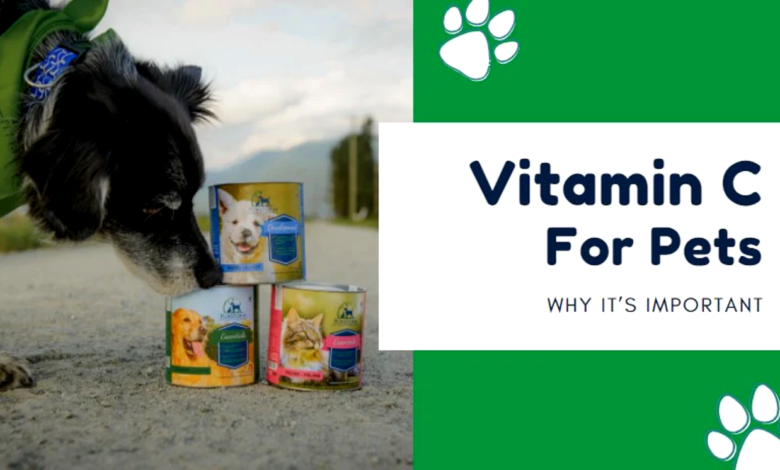
The Truth About Vitamin C for Pets
When it comes to the health and well-being of our furry friends, ensuring they receive proper nutrition is crucial. Just like humans, pets can benefit from certain vitamins and minerals to support their immune system, overall health, and longevity. One such nutrient that has gained considerable attention is vitamin C. In this article, we will explore the truth about vitamin C for pets, its benefits, potential risks, and how to incorporate it into your pet’s diet.
Read More: Understanding Pet Nutrition: Choosing the Right Diet for Your Pet
The Importance of Vitamin C for Pets
Vitamin C, also known as ascorbic acid, is a water-soluble vitamin that plays a vital role in the overall health of pets. While dogs and cats can synthesize vitamin C internally, there are certain situations where supplementation can be beneficial. Just like humans, pets can experience stress, illness, and other factors that can deplete their vitamin C levels. Supplementing with vitamin C can help restore and maintain optimal health in these cases.
Natural Sources of Vitamin C

The best way to provide your pet with vitamin C is through a balanced and nutritious diet. There are various natural sources of vitamin C that you can incorporate into your meals. Fruits such as oranges, strawberries, and kiwis are rich in this essential vitamin. Vegetables like broccoli, bell peppers, and kale also contain high amounts of vitamin C. Including these foods in your pet’s diet can provide them with a natural and bioavailable source of this nutrient.
The Benefits of Vitamin C for Pets
Vitamin C and the Immune System
Vitamin C plays a crucial role in supporting the immune system of pets. It helps in the production of white blood cells, which are responsible for fighting off infections and diseases. Adequate levels of vitamin C can strengthen the immune response and enhance your pet’s ability to ward off illnesses.
Vitamin C for Joint Health
Pets, especially ageing ones or those with certain health conditions, can experience joint pain and inflammation. Vitamin C has antioxidant properties that can help reduce oxidative stress and inflammation in the joints. This can potentially alleviate discomfort and improve mobility, allowing your pet to enjoy an active and pain-free life.
Vitamin C and Aging
As pets age, their bodies undergo changes that can impact their overall well-being. Vitamin C acts as an antioxidant, protecting the body against free radicals that can cause cellular damage and accelerate the ageing process. By incorporating vitamin C into your pet’s diet, you can help promote healthy ageing and support their overall vitality.
Administering Vitamin C to Pets
Before introducing any supplements, it is essential to consult with your veterinarian to determine the appropriate dosage for your pet’s specific needs. Vitamin C supplements for pets are available in various forms, including chewable tablets, powder, and liquid. These supplements are specially formulated for pets and may come in different strengths. Follow the recommended dosage guidelines provided by your veterinarian and administer the supplement accordingly.
Potential Risks and Side Effects
While vitamin C is generally safe for pets when administered in appropriate amounts, excessive intake can lead to potential risks and side effects. Pets with certain medical conditions, such as kidney problems, may be more sensitive to high levels of vitamin C. Excessive vitamin C can cause digestive upset, including diarrhoea and stomach discomfort. Always consult with your veterinarian before adding any supplements to your pet’s diet.
Consult Your Veterinarian
As with any aspect of your pet’s health, it is crucial to consult with your veterinarian before making any significant changes to their diet or introducing supplements. Your veterinarian will consider your pet’s specific health needs, medical history, and any potential interactions or contraindications before recommending the appropriate course of action.
Read More: Summer Pet Care Tips 2023
FAQs
Can I give my pet a vitamin C supplement meant for humans?
No, it is not recommended to give your pet a vitamin C supplement meant for humans. Pets have different dietary requirements, and certain formulations meant for humans may contain additives or ingredients that can be harmful to pets. Always choose supplements specifically designed for pets and consult with your veterinarian for proper guidance.
How do I know if my pet needs vitamin C supplementation?
If you suspect your pet may benefit from vitamin C supplementation, it is essential to consult with your veterinarian. They can assess your pet’s overall health, consider any specific conditions or deficiencies, and recommend the appropriate course of action.
Can vitamin C cure diseases in pets?
Vitamin C is not a cure for diseases in pets. However, it plays a supportive role in maintaining overall health and enhancing the immune system. It is important to remember that proper veterinary care and treatment are necessary for addressing specific diseases or conditions.
Are there any specific breeds or species that benefit more from vitamin C supplementation?
Certain breeds or species of pets may have a higher likelihood of benefiting from vitamin C supplementation. For example, larger dog breeds may experience joint issues and may benefit from the antioxidant properties of vitamin C. However, it is always best to consult with your veterinarian to determine the specific needs of your pet.
Can I give my pet too much vitamin C?
While vitamin C is generally safe for pets, excessive intake can lead to potential risks and side effects. Always follow the recommended dosage guidelines provided by your veterinarian and avoid exceeding the recommended amount. If you have any concerns, consult with your veterinarian for appropriate guidance.
Conclusion
Vitamin C can be a valuable addition to your pet’s diet, providing numerous benefits for their immune system, joint health, and overall well-being. By incorporating natural sources of vitamin C and consulting with your veterinarian, you can ensure your pet receives the right amount of this essential nutrient. Remember, your pet’s health is a priority, and any dietary changes should be made under professional guidance.







